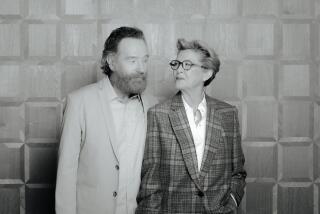Her subject, and maturity, go way beyond her years
Sarah Polley, the best actress not enough people know about, is poised to become a director everyone is talking about.
“Away From Her,” Polley’s first feature as a writer-director, comes to the Sundance Film Festival after an opening at Toronto that had local critics calling it “one of the most astonishing feature debuts by a Canadian director in ages.” A beautifully done film made with delicacy and classic virtues, it showcases a luminous Julie Christie in a drama revealing what the onset of Alzheimer’s does to a marriage. Although an Alzheimer’s story is not exactly what you’d expect from a 28-year-old director, Polley has made a habit of making a success out of doing the unexpected.
In film in Canada since she was 6 and perhaps best known for her work in Atom Egoyan’s “The Sweet Hereafter,” the gifted Polley has made a conscious decision to avoid the classic young Hollywood actress career and instead work with such auteur directors as Egoyan, Wim Wenders, Hal Hartley and Michael Winterbottom. Cast in the role Kate Hudson would ultimately take on in “Almost Famous,” she dropped out of the project, a decision she feels led directly to directing, a job she plainly adores.
“I feel so kind of infinitely happy and exhilarated,” she says with a grin. “Every nightmarish thing that happens, I enjoy it more, which is the sign of true addiction. It’s the intensity of the collaboration that I like. Having an idea by yourself in a room and a few months later, 40 very talented people are helping you do it is so magical. Plus, when I acted as a child, I’d get sent away from the set to do my schoolwork when the really interesting things happened. This time, I finally got to be one of the guys.”
“Away From Her” is based on a short story by Alice Munro, one of Canada’s most revered writers, and Polley admits “my first instinct was that it should be left as a story. But it had such an emotional impact on me, I went back to it again and again, maybe 25 or 30 times. It was the idea of the kind of love story that doesn’t often get told on film. It’s not a chemical collision between two young people, but a story of people who’ve failed each other, who’ve been battered around by life.”
Polley also thought of this as a film because she read the story (“The Bear Comes Over the Mountain”) flying back from Iceland after costarring with Christie in “No Such Thing” and “I couldn’t stop seeing her face in the role.” But even though the two actresses are good friends, getting her in the project was not easy.
“Acting is not her reason to get up in the morning,” Polley explains. “She’s the most curious, engaged person I have ever known, she is somehow a very pure entity, a wonder to behold. But she has a completely ephemeral quality, and I was always chasing her for the part like this mad, lost suitor. It was an epic journey, a trial by fire, but I was like a dog with a bone and I wouldn’t let go. But I did feel like this 15-year-old boy chasing this woman through the streets.”
Despite all her experience, Polley, who’d already directed several shorts, says that “even though everyone thinks it’s a lot easier, it’s harder to direct after acting. It’s like learning to walk again, it’s seeing things through different eyes, going through some kind of looking glass with everything turned upside down.”
More than that, “having as an actor seen so many first-time directors play the role, working so much harder than the actors pretending they knew everything when everyone knew they didn’t know anything, I didn’t want to go through that kind of embarrassing ritual.”
Because she respected the story so much, Polley was determined to resist the “pressure to do something cool and stylish visually, to do something that supposedly represents my generation. It was a constant temptation every day to prove to people I could move the camera, that I had a sense of style. And every day I tried to shut that voice inside me up.
“Luc Montpellier [the director of photography] and I would catch each other trying to play tricks, and our rule became ‘we will not show off.’ We would resist the pressure to show our bag of tricks. I don’t want to have a bag of tricks. I tried to leave ego out of it to a certain extent. If I show things with a semblance of honesty, maybe that bag of tricks will form itself.”
Remarkably self-aware, Polley looks back on her decision to leave “Almost Famous” as a turning point in her life, a decision to keep fame at bay and have as normal a life as possible. “My first experience with a sliver of fame was as a girl when ‘Baron Munchausen’ debuted in Berlin, and a mob was so eager for my autograph they tried to pull open the door of my car and my father was trying to pull it closed, so I never had anything other than horrifying experiences.
“But when I made that particular decision not to do that big Hollywood movie, I couldn’t have articulated why I was so dead set against that life. That decision was pure survival; it takes enormous strength to retain humanity and a sense of self in that world, there is so much wanting, so little being, and some part of me knew that I couldn’t have survived. But at the time I was at a loss as to why I had done it. I went into a pretty serious depression. But that led to my doing my first short film, to meeting the people I am still working with today, including my husband. It led me to realize that being a filmmaker is something I needed and wanted to do.”
*
More to Read
Only good movies
Get the Indie Focus newsletter, Mark Olsen's weekly guide to the world of cinema.
You may occasionally receive promotional content from the Los Angeles Times.







